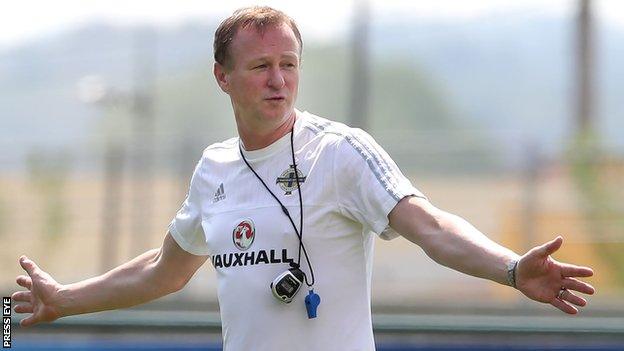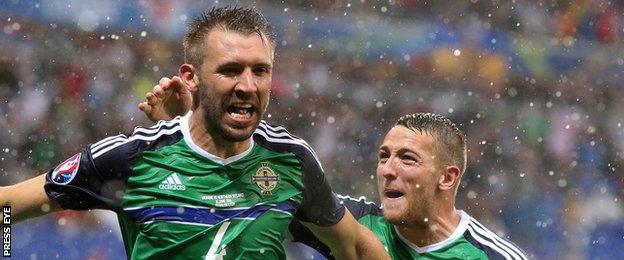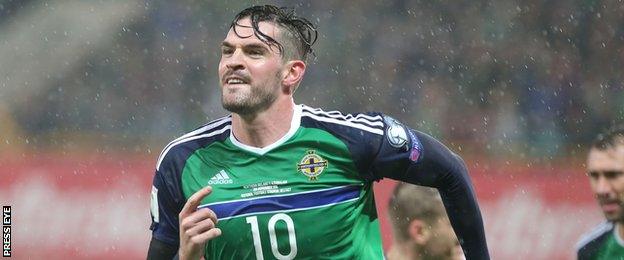Michael O'Neill: The man who put the pride back in the Northern Ireland team
- Published

O'Neill guided Northern Ireland to a first major finals for three decades
Michael O'Neill will always be regarded as the man who restored pride in and transformed the fortunes of the Northern Ireland football team.
The new Stoke City boss's lasting legacy will include guiding his country to a first appearance at a major finals for 30 years and making them a force to be reckoned with on the international stage.
The narrative was a very different one when Nigel Worthington departed in October 2011 with the fortunes of the team at a low ebb - poor results, discontent in the camp and rumours of retirements combining to sap morale.
As a player O'Neill earned 31 Northern Ireland caps in midfield and forward roles but few would have predicted the remarkable impact he would make in the managerial post he would occupy for eight years following his appointment two months after Worthington's departure.
To secure the position, O'Neill saw off the challenge of his good friend and his assistant at Shamrock Rovers - former Oxford United and Ipswich manager Jim Magilton - and also another NI stalwart with experience of managing at a high level, in Iain Dowie.
The former Newcastle United player had limited experience as a manager with Brechin City and Dublin-based League of Ireland side Shamrock Rovers - but his achievement in taking Rovers to the group stages of the Europa League and his vision for the future evidently impressed his future employers at the Irish Football Association.
A shaky start
The first few years of O'Neill's reign were far from plain sailing - the team's struggles reflected in the fact that by September 2012 their Fifa ranking had hit an all-time low of 129 - a far cry from the high of 20th place they would occupy five years later.
The qualification campaign for the 2014 World Cup finals was a disappointing one as 'The Green and White Army' had just one win to celebrate from 10 matches - a victory over Fabio Capello's Russia in August 2013.
An away defeat by Luxembourg and a home draw against the same opposition were the low points of that series - but the IFA kept faith with their man - and how the ex-Dundee United midfielder repaid their trust.
While Lawrie Sanchez's time at the helm was marked by a number of never-to-be-forgotten one-off giant-killing nights at Windsor Park, O'Neill moulded a squad which against all the odds found a level of consistency required to qualify for a European Championships for the first time - and almost a first World Cup finals for 32 years.
Tactical acumen and professionalism
O'Neill's philosophy of the sum of the parts being more effective than individual star performers built a sense of togetherness and collective team spirit which served a squad with a paucity of Premier League players at its disposal well.
The 50-year-old perfected the art of getting the very best from his players through a combination of shrewd tactical acumen, assiduous attention to detail, professionalism in areas such as sports science and analysis, belief and preparation.
That heady mix transformed the team into an efficient, well-organised unit with some good talented professionals and a good blend of youth and experience, although far from a 'golden generation'.

Gareth McAuley celebrates with Conor Washington after scoring in the 2-0 win over Ukraine at Euro 2016 in France
Tactically, his style was pragmatic - always a bespoke game plan in place depending on the opposition - difficult to break down, with pressing and exploiting opportunities to score from set-pieces or on the counter-attack in mind. It was a formation that his squad grew comfortable and familiar with and yielded positive results.
Tangible reward was to follow as a memorable night in Belfast in October 2015 saw NI beat Greece 3-1 to secure their passage to the Euro 2016 finals in France, the celebrations lasting long into the night and beyond.
The Green and White Army descended on France in their thousands for the tournament itself and the team created more cherished memories - a 2-0 win over Ukraine, a stubborn rearguard action in losing to Germany by just a single goal and a spirited display in the unfortunate defeat by Wales as they missed out on a quarter-final spot.
Play-off heartbreak and an offer from Scotland
A second place in group qualifying for the 2018 World Cup proved enough to clinch a play-off spot - but agonisingly that infamous handball decision against Corry Evans and the resulting penalty in the first leg proved enough to give Switzerland a 1-0 aggregate success.
Speculation about O'Neill's future was often rife throughout his tenure, but having been linked with clubs such as Sunderland and West Bromwich Albion, a firm offer finally materialised in the form of an invitation to try to resurrect the fortunes of the Scotland national team.
He opted to resist their overtures on the back of an improved offer of around £750,000 a year from the IFA, plus a long-term contract which would see him remain in place until 2024.
The inaugural Nations League tournament threw up more than its fair share of 'hard luck stories' as the NI boss introduced a more adventurous style of play - but the country's age-old problem of failing to find the net on a regular basis reared its ugly head again.

Kyle Lafferty's seven goals helped propel NI to Euro 2016 but the striker has not found the net since scoring against Azerbaijan in November 2016
Seven goals from Kyle Lafferty had played a major part in the run to Euro 2016, but when the big striker's prolific form dried up, the lack of a regular scorer often proved Northern Ireland's undoing.
Being drawn with Germany and the Netherlands was always going to make progression from Euro 2020 qualifying Group C a daunting task - but home and away wins over Estonia and Belarus at least kept hopes alive until the back-to-back meetings with the two European heavyweights in the autumn.
Slim ambitions of qualifying as one of the top two remain - but the more realistic option looks to be the potential route of the play-offs next March.
Northern Ireland supporters can take solace in the fact that despite the lure of club management proving too strong, O'Neill will remain in charge for those crucial games if that eventuality comes to pass.
They will hope that he can pull one more rabbit out of the hat - weave his magic one final time to secure a second successive appearance at the Euros.